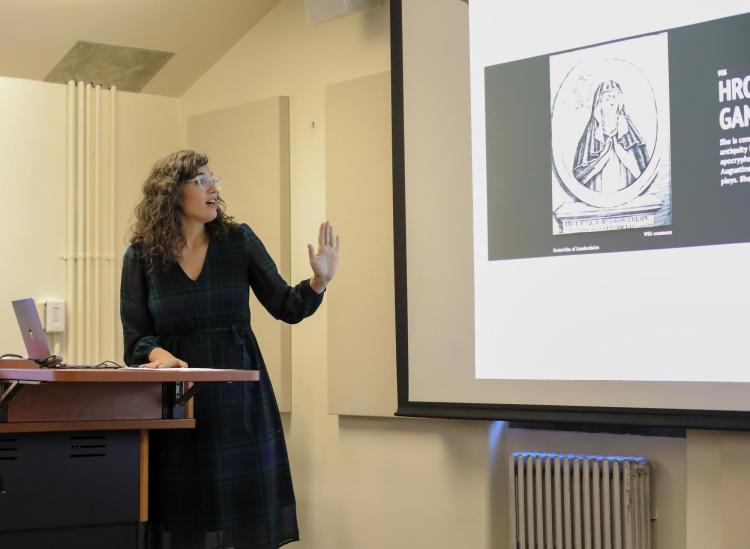The University Libraries are honoring the four Provost’s Fellows through a series of stories chronicling each of their projects. The topic for Spanish and Portuguese PhD student Taiko Haessler’s 2019 Provost’s Fellowship for the Libraries “Medieval Women In Philosophy” project stemmed from research that points to female philosophers from this period in history that have been largely absent from relevant teaching curriculums.

Provost's Fellow Taiko Haessler presents on Medieval Women in Philosophy.
Haessler’s interest in women from the medieval ages is as much about the present as it is the past. Traditionally, female philosophers from this era are left out of textbooks, lectures, and other academic resources that are widely accessible.
With assistance from the Libraries’ history and philosophy librarian Frederick Carey, Haessler stumbled upon histories of female philosophical thought. Carey had already begun compiling a list of medieval women involved in philosophical discourse.
“It turned out to be much more complex than I had thought,” Haessler said. “Not all of them were writers. Some of them wrote music, some of them made manuscripts. But it was really kind of the illuminations and the visual art they became known for.”
Thinking that the breadth of subtopics warranted more than a traditional biography, Haessler created a webpage on CU Boulder’s website that includes conclusions drawn from her research and an interactive timeline of women philosophers and their work from medieval times.
“I was gathering not only biographies and brief introductions to written works but also establishing some kind of guidelines for a pedagogical application so they can be readily adapted into philosophy, history, or literature syllabi as women who historically have been overlooked in these courses,” she said.
Haessler said the timeline especially is meant to be used in classrooms in a way that’s easy for professors to use and students to follow. Having the information widely accessible in its delivery meant writing succinctly and including stimulating visuals. In time, Haessler feels that the depth of this research would lend itself to a Wikipedia Edit-a-thon.
“Being able, first of all, to have that kind of seed planted with this fellowship, and then being allowed to expand on this topic and being allowed to nurture this idea into becoming something much more complex allowed me to learn so much more about the different intellectual dynamics throughout Western Europe,” she said.
